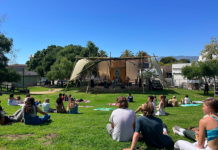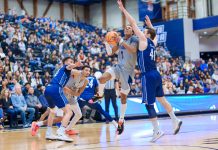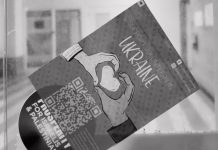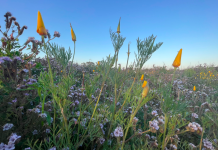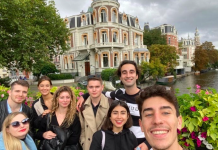Kyle Roe
Staff Writer
Storke Tower was lit up on the evening of Feb. 12 in a mournful and empowering candlelit vigil in the memory of Deah Barakat, 23, Yusor Abu-Salha, 21, and Razan Abu-Salha, 19, hosted by the UCSB Muslim Students Association.
The three deceased were Muslim-American students at the University of North Carolina, Chapel Hill who were shot in the head, execution style, in their Chapel Hill condo by Craig Stephen Hicks on Feb. 10. The defendant and his wife claim the murders were over a contested parking space, but an Islamophobic motive is under strong consideration from both investigators and widespread media sources. While no hard evidence of an Islamophobic motive has been found on the shooter’s computer, numerous posts on social media have reveled him as a strong anti-theist, or someone who is actively opposed to all religions. Yusor and Deah were a newlywed couple, Razan was Yusor’s sister.
The vigil was a quickly organized gathering of support and unity for the Muslim community from people of many different backgrounds. All in attendance were given plastic flickering candles, though some brought their own, and socialized behind a group of MSA students holding paper signs displaying messages like, “Stop Hate Speech. Stop Hate Crime”, “#OurThreeWinners” in reference to the three slain students the rally was in honor of, and “Muslims only Newsworthy when Behind a Gun. Not in Front of it.”
“We organized the vigil because we felt, as UCSB students, we know what it is to lose fellow students,” said Yasmin Sallak, fourth-year biochemistry major and President of the UCSB Muslim Students Association.
“We heard about the people who were killed because of religion–you don’t hear about it on TV, so we wanted to show that we cared about them, that people cared about them,” said Aracel Villanueva, first-year global studies major and Muslim Students Association member. “[Islamophobia] exists and there needs to be a change. People should be informed of what Muslims really believe and practice. They should be shown that we do not harm them, so they should not harm us.”
After a brief announcement by Sallak restating the purpose of the vigil, the procession began. The crowd walked in silence from Storke Tower to Buchanan Hall, gathering together on a grassy hill in front of Buchanan. It was here that everyone stood in a circle and listened to members of the MSA deliver passionate speeches about Deah, Yusor, Razan, and the tragic consequences of Islamophobia. They spoke of how the three students contributed to charity and were active volunteers. Yusor and Deah were passionate about dentistry and worked hard raising money to provide dental care to Syrian refugees. Yusor had already travelled to Turkey to help Syrian refugees with dental work as a volunteer, and Deah was planning to do the same this summer. Razan was a talented artist putting in hard work to get a college degree.
One of the speakers told the story of the prophet Muhammad and the garbage thrower, a vengeful woman who tossed her garbage on Muhammad’s doorstep from her roof for days to provoke an angry reaction. One day she was not on her roof as usual, which worried Muhammad, so he went inside to check up on the woman and found her ill. He prayed for her health and cared for her, a lesson in showing kindness to everyone. She soon saw the error of her ways and apologized.
After the speeches and a brief open mic, which included a singing of “Peace on Earth”, members of the MSA conducted the Muslim funeral prayer for Deah, Yusor, and Razan. Everyone then laid their candles on a pile of paper signs, ending the vigil.
According to Sallak, the killings indicated that Islamophobia is alive and well.
“[Islamophobia] dehumanizes people based on their beliefs,” said Sallak. “It puts all Muslims under the umbrella of terrorism even though most of us grew up in America. We need to see all people as human beings. We need to be respectful and accepting of those beliefs. I believe that just because you have a different faith does not give you the right to kill someone.”
